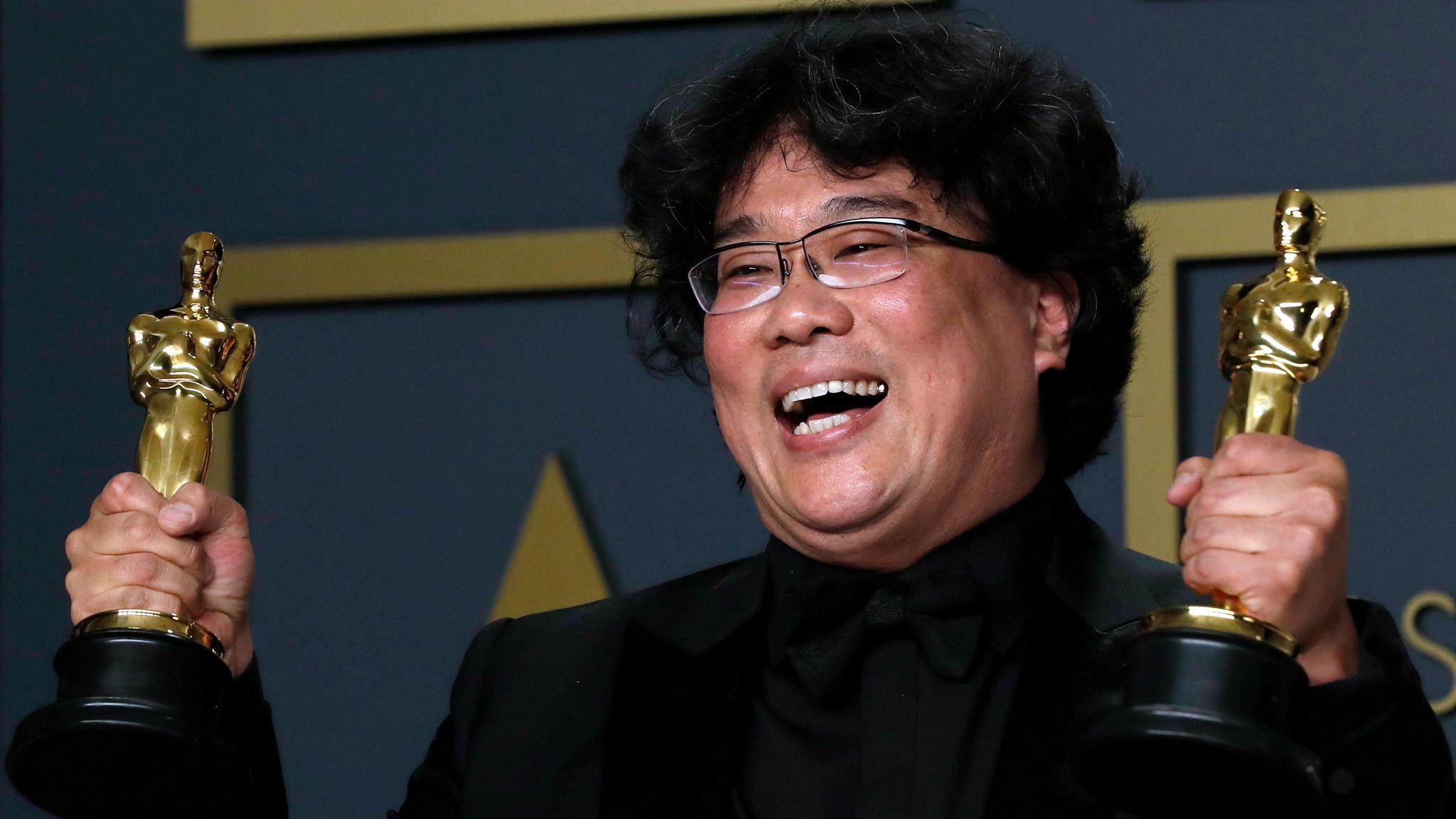Squid Game: The rise of Korean drama addiction
- Published

Netflix's Korean thriller Squid Game has become a worldwide sensation
If watching Squid Game means the prospect of playing red light, green light now fills you with nerve-shredding terror rather than fond childhood memories, you aren't alone.
The Korean thriller, which tells the story of debt-ridden people competing for a huge cash prize in a deadly series of children's games, has become Netflix's biggest ever series launch - streamed by 111 million users in its first 28 days.
In doing so it knocked Bridgerton off the top spot, making clear that Korean dramas have most certainly been given the green light by audiences worldwide.
So, how can we understand this rise, and what are some of the other K-dramas to look out for if you're a new convert?
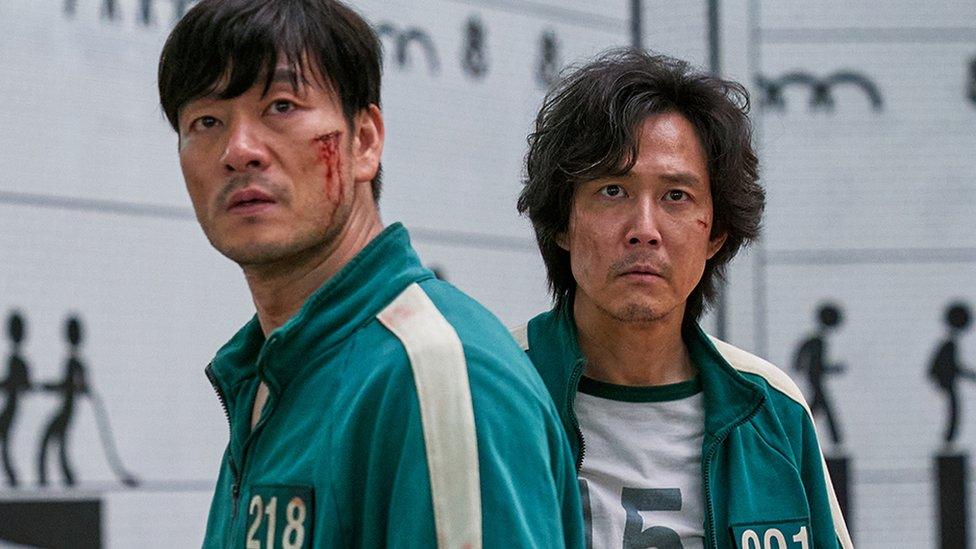
Park Hae-soo and Lee Jung-jae are two of the stars of Squid Game
Squid Game's breakthrough popularity marks the latest wave in a Korean culture tsunami that's built throughout the West in recent years.
The show joins K-pop artists such as BTS and Blackpink, who have become household names in music, and films like Parasite and Minari, which achieved Hollywood recognition and Oscars success.
But the K-drama takeover is far from the overnight sensation it may first seem.
Although they've only recently gripped worldwide audiences, K-dramas have been popular in Asia for decades.
Increasing liberalisation throughout the country in the 90s saw huge amounts of money poured into the entertainment industry, and over the next decade it challenged the might of Japan as Asia's cultural powerhouse.
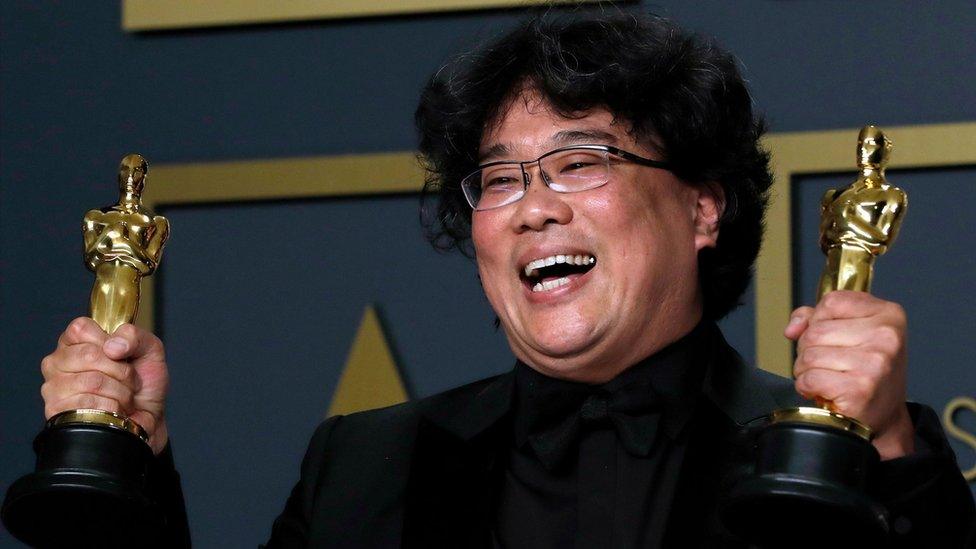
Bong Joon-ho won best director, best original screenplay and best picture for Parasite at last year's Oscars
According to Elle magazine, a 2011 report by the Korean Culture and Information Service concluded: "In many Asian cities, Korean dramas seem to be influencing lifestyles and consumer behaviour, which speaks to their cultural appeal."
Regina Kim, a freelance US journalist who wrote about the rise of K-dramas for Elle in August, external, says they have been popular throughout Asia, the Middle East and Latin America for years, and North America and Europe are now catching up.
Although a report found that 18 million Americans were watching Korean shows in 2014, Kim told the BBC: "I think many American K-drama fans were a bit hesitant to talk about our love of K-dramas openly then, since it was never part of mainstream conversations in the US until quite recently."
Parasite's success
Global interest grew as streaming services like Viki and DramaFever let viewers watch Korean TV with English subtitles, opening K-dramas up to a new audience over the past decade.
Meanwhile, Netflix began massive investment, making 80 South Korean series and films since launching in the country in 2016.
The word-of-mouth success of 2019 romantic drama Crash Landing on You coincided with the big-screen popularity of Parasite, which won best picture at the 2020 Oscars, to spark new-found levels of interest.

Ji Chang-wook is one of the recognised K-drama stars
Then the pandemic happened, and with the Western entertainment industry (literally) shuttered, K-drama fever truly hit as viewers were drawn into the varied storylines and comforting escapism.
"Now, with the success of Squid Game, coupled with the sheer number of people who discovered K-dramas during the pandemic, I think we'll see K-dramas becoming increasingly popular in the West, and especially in the US," Kim says.
London-based writer and K-drama fanatic Taylor-Dior Rumble explains: "Most popular K-dramas are typically ultra stylised, glossy and quite removed from reality, which is why they're such a great form of escapism.
"After such a bleak few years, people are gravitating more towards heart-warming forms of entertainment," she says.
There is a "wide range of shows containing plenty of unique ideas and unexpected storylines that you'd probably never get from a British or American channel", which range from fantasy and sci-fi to action and thriller, Rumble says.
This broad appeal is helped by the family-friendly tone. "There's practically no nudity or sex," adds Rumble. "Korean society is quite conservative so this means a lot of their shows hold cross-culture appeal."
Add in high-end production values and stunning locations, and Rumble says the dramas offer "a rich and pleasurable viewing experience that you simply don't get enough of anywhere else".
K-dramas also reflect worldwide social stresses that resonate with many younger generations.
"As the wealth gap between the rich and poor continues to widen and other inequalities continue to increase, Parasite's frank exposure of the extremes in Korea resonated with so many people" says Rumble.
Squid Game, she feels, is similarly pointed beneath its bloodied popcorn exterior.
"It tackled a lot of situations, such as debt and the pressures of providing, which was probably somewhat relatable to a world still recovering from a pandemic that has been incredibly difficult for a lot of people."
Hooked after Squid Game? Here are six K-drama alternatives
Crash Landing on You (for fans of romance)

There is a perhaps no better introduction to the weird and wonderful world of small-screen K-dramas than this story of an heiress who crashes her paraglider in the militarised zone between North and South Korea during a tornado.
She's found by a benevolent North Korean soldier - and so begins a star-crossed love story that's full of intrigue, political subtext and cute humour.
The 16-episode series was a huge hit when it was aired in South Korea in 2019.
Vincenzo (for fans of gangster shows)
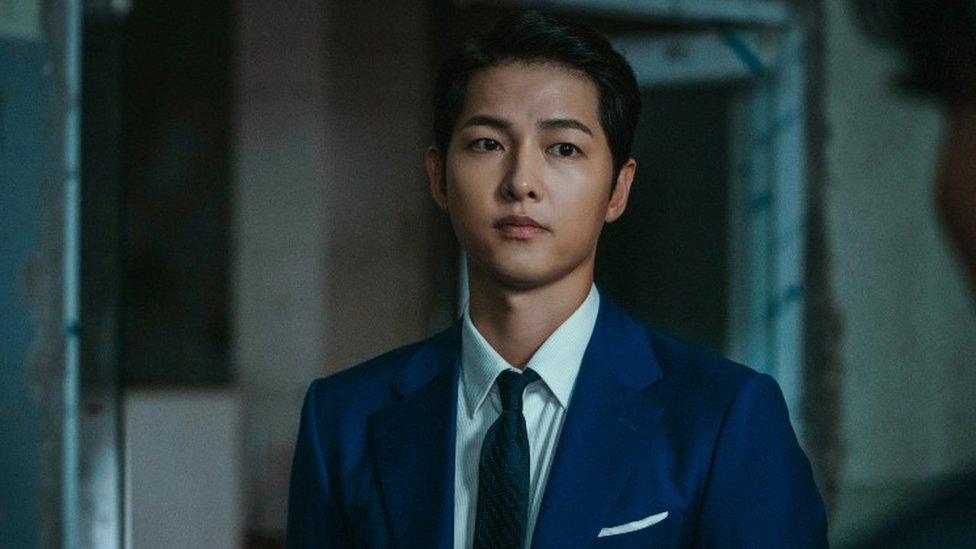
Vincenzo Cassano (Song Joong-ki) is a lawyer and consigliere for the Italian mafia. After returning to his homeland of Korea, he takes on a corrupt CEO and his henchmen and a flurry of other bad guys, as well as sticking up for local business; dealing justice on both sides of the law.
It's a love letter to crime, gangster and legal dramas - penned in incredibly addictive form.
Oh My Ghost (for fans of weirdly sexy ghost stories)
A young, timid assistant chef is possessed by the ghost of a young woman who died a virgin and believes she won't pass to the afterlife until she has sex.
"This plot device performs the function alcohol usually does in K-drama, allowing the shy Bong-sun to talk back to her handsome boss," The New York Times wrote, external.
Cue comedy and sexual desire K-drama style…
Kingdom (for history/horror buffs)
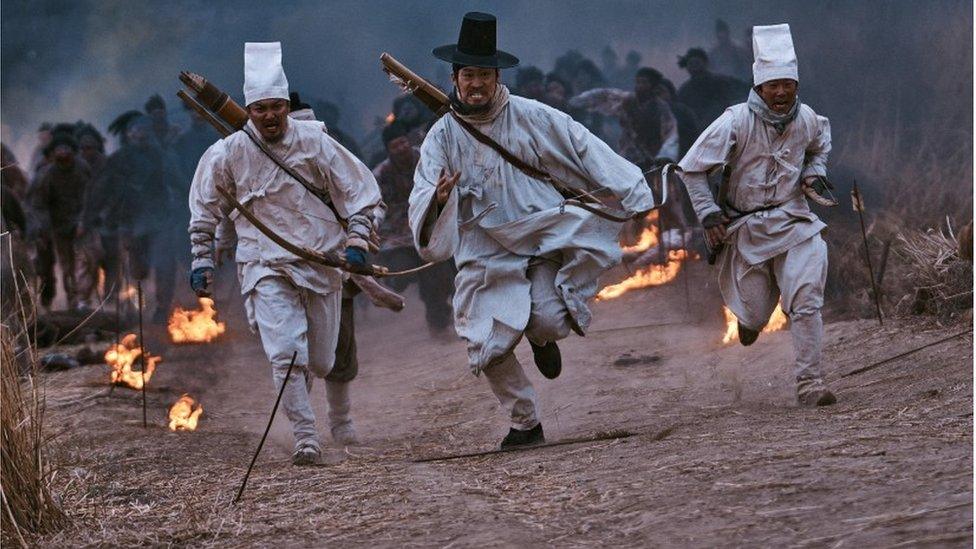
Fancy a historical zombie drama about a 17th Century crown prince, who has to fight a mysterious plague of flesh-eating zombies that threaten to overtake his kingdom?
If that's a yes, this is for you.
Inheritors (for KUWTK fans)
Also known as The Heirs, Inheritors follows the friendships, rivalries and romances of a group of wealthy young students as they prepare to take over their family businesses.
Expect love triangles, drama that would make the cast of The Bold and the Beautiful blush, and storylines the Kardashians could only dream of.
Strong Girl Bong-Soon (for superhero fans)
A young woman has to harness the superhuman strength that is passed down the female side of her family.
When her secret eventually gets out, she helps to form a crime-fighting team that would give any of the X-Men or Marvel/DC cohort a delightfully nerdy run for their money.

This article has been amended due to an editorial issue.
Related topics
- Published15 October 2021

- Published13 October 2021
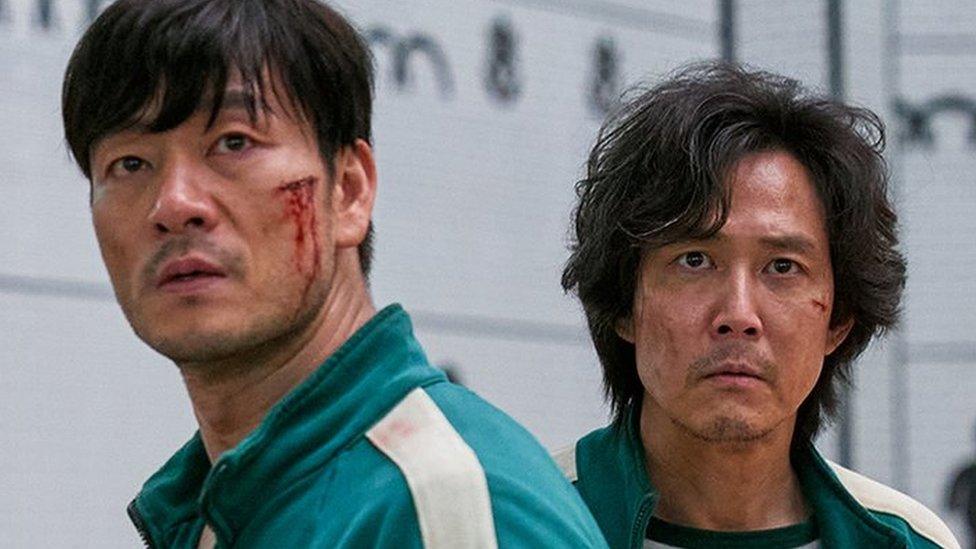
- Published1 October 2021
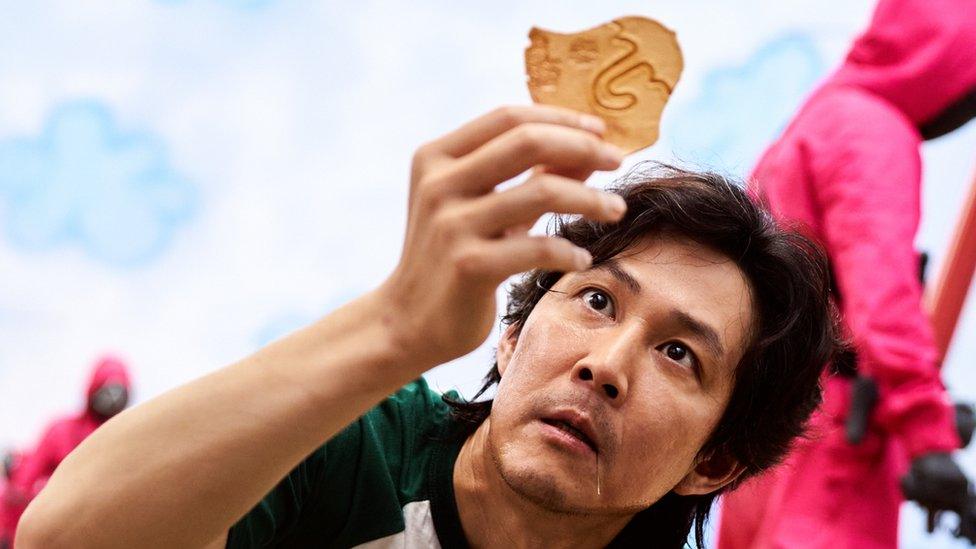
- Published10 February 2020
